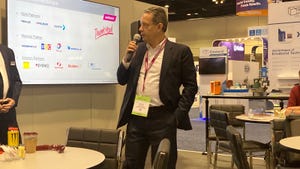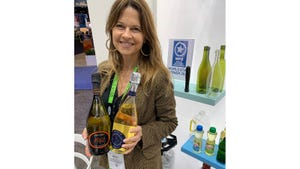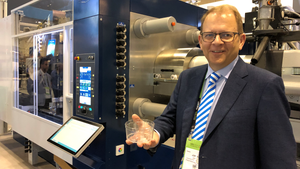Gas assist is going mainstream
May 1, 1997
The number of molders in North America molding with gas assist is up to 6 percent, according to GE Plastics' Jack Avery. The light yellow portion represents molders who have not taken one of the licenses.
 With what he says is becoming his "annual rite of Spring," GE Plastics' Jack A. Avery opened Molding '97 with a business and technology update on gas-assisted injection molding. Molding '97 (March 24-26, New Orleans) was the seventh annual conference and exhibition in the series focusing on emerging molding technologies and business trends. In addition to Avery's, there were more than seven other presentations that dealt with gas assist. "Gas assist is becoming a mainstream process," says Avery. "Its promise is being delivered."
With what he says is becoming his "annual rite of Spring," GE Plastics' Jack A. Avery opened Molding '97 with a business and technology update on gas-assisted injection molding. Molding '97 (March 24-26, New Orleans) was the seventh annual conference and exhibition in the series focusing on emerging molding technologies and business trends. In addition to Avery's, there were more than seven other presentations that dealt with gas assist. "Gas assist is becoming a mainstream process," says Avery. "Its promise is being delivered."
OEMs are expressing a tremendous interest in using gas assist, "not always for the correct reasons," according to Avery. Regardless, he says this interest is sparking wide discussion of the process in the field. "In the past few years, several very challenging applications have been cost-effectively manufactured using this technology." Avery cites as examples the Delphi Superplug door hardware module, the Isuzu instrument panel, the Chrysler Dakota wheel lip, the Motorola linear power amplifier, and the Thompson five-disk CD platter. "As the OEMs become more aware of the value that can be achieved, they are requesting more of their components to be manufactured using this technology."
Avery says that there was rapid growth in the number of gas-assist licenses and molds as first quarter 1997 closed. He estimates that, in total, about 400 process licenses had been purchased, while reminding everyone that some gas-assist technologies require no licensing. And he says that there are now about 1000 active gas-assist molds in North America - "never mind other places like Japan and Southeast Asia." Avery also estimates that 6 percent of molders now have gas-assist capabilities (above).
"Further evidence of this maturation is the fact that gas-assist prototype molding services are becoming available," Avery adds. He offers Allmand Assoc. and Papago Plastics as two examples of rapid prototypers licensed to mold with gas. This is important because gas assist allows complex parts to be molded at low mold pressures and, subsequently, in less costly tooling, like aluminum tools. It also allows some larger parts to be run on smaller machines. "Gas assist may contribute to the core value of the prototyping process: the ability to provide more parts faster, at less cost."
Avery provides an overview of some of the novel technologies that have recently been introduced. There's the RF Topola floating core molding process (RFM) from RF Topola, a Japanese molder. With RFM, a steel or plastic ball of the required inner pipe diameter is positioned over the gas-injection nozzle prior to mold closing. Resin injection propels the ball along the path of least resistance, creating an open channel. Avery also says almost every gas-assist system supplier is working on more efficient advanced pin designs, and that gas assist is finding utility assisting other processes, like coinjection. Joe McRoskey of Co-Mack Technology, a coinjection molding expert, gave a presentation on this topic at Molding '97. And Avery adds that you can soon expect to see new developments in gas-assist molding simulation from the likes of C-Mold and Plastics & Computer.
Users are beginning to find leasing units for onsite nitrogen production to be a "pretty good case of economics." Issues like volume, purity, and pressure requirements and like volume requirements vs. cost, handling, and safety make leasing an attractive option as part volumes increase and job runs lengthen. With the obvious exception of Hettinga's liquid-gas system, which uses no nitrogen, many companies are choosing to lease upgradable gas generation units from suppliers like Air Liquide, Air Products and Chemicals, Battenfeld, Bauer Compressors, and Cinpres. Nitrojection and Gain are planning to offer nitrogen generation capabilities, too. Leasing costs can run from $400 to $1400 per month, depending on unit capacity. Depending on use volume, payback can be in a few weeks. And operating costs can be reduced from about $6/hour to 55 cents/ hour through leasing.
With the exception of Michael Ladney's claim of ownership of the "spillover patent" last year, which relates to use of overflow wells, Avery reiterates what he said at Molding '96 - namely, that the gas-assist legal climate has settled down. A U.K. Patent Court ruled that Ladney owns it, but Avery says the ruling was reversed in a later decision. "Use of spillovers in the gas-assist injection process enable the gas to penetrate larger cross sections, which are remote from the gate," he explains. "Some of the polymer melt inside the mold can be pushed into the spillover to enable the pressurized gas to flow evenly throughout the mold." Cinpres says this overflow technology is now officially in the "public domain," so you can use it without fear of being sued.
In conclusion, Avery reiterates another of his Molding '96 themes - that getting product designers educated in designing for the gas-assist process is the critical element. "Discussions with those converters currently using gas-assist injection molding indicate that most applications that they receive from the OEM 'designed' for the process require significant modification." Suppliers and molding simulation software providers offering design assistance include Aegis Technologies, Battenfeld, C-Mold, Caropresso Assoc., Cinpres, Epcon, Gain, Hettinga, Moldflow, Nitrojection, and Plastics & Computer. Then there are molders who are actively involved in the process. "They know what works and what does not," Avery says.
Everyone has to work together to educate the OEM design community, to help speed more competitive products to market. Early-on involvement must include at least the molder, material supplier, moldmaker, prototyper, and the industrial designer, if gas assist is truly to become the "mainstream process" Avery believes it promises to be.
You May Also Like


